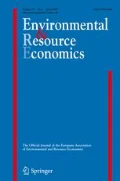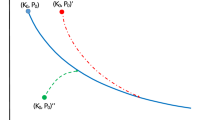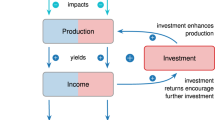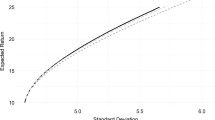Abstract
This paper develops two-period analytical and numerical models to study the question: given a stock of greenhouse gases that poses a risk of future damages of unknown magnitude, and the possibility of learning about damages, how do sunk abatement capital and a nondegradable stock of greenhouse gases affect optimal first-period investment? We show that both affect investment, the former negatively and the latter positively. Additionally, endogenous risk – the risk of damages dependent on the stock of gases – results in an increase in optimal investment for any level of capital ‘sunkness’ or greenhouse gas degradability. Quantitatively, the effect of sunk capital is stronger than the effect of greenhouse gas irreversibility or that of endogenous risk.
Similar content being viewed by others
References
Arrow, K. J. and A. C. Fisher (1974), ‘Environmental Preservation, Uncertainty, and Irreversibility’, Quarterly Journal of Economics 88(2), 312-319.
Chichilnisky, G. and G. Heal (1993), ‘Global Environmental Risks’, Journal of Economic Perspectives 7(4), 65-86.
Cline, W. R. (1992), The Economics of Global Warming. Washington DC: Institute for International Economics.
Dixit, A. K. and R. S. Pindyck (1994), Investment under Uncertainty. Princeton University Press.
Farzin, Y. and O. Tahvonen (1996), ‘Global Carbon Cycle and the Optimal Time Path of a Carbon Tax’, Oxford Economic Papers 48, 515-536.
Fisher, A. C. and W. M. Hanemann (1993), ‘Assessing Climate Change Risks: Valuation of Effects’, in J. Darmstadter and M. A. Toman, eds., Assessing Surprises and Nonlinearities in Greenhouse Warming: Proceedings of an Interdisciplinary Workshop. Resources for the Future.
IPCC (2001), ‘Climate Change 2001: The Scientific Basis’, Technical report. Intergovernmental Panel on Climate Change.
Joos, F., G. Muller-Furstenberger and G. Stephan (1999), ‘Correcting the Carbon Cycle Representation: How Important Is It for the Economics of Climate Change?’, Environmental Modeling and Assessment 4, 133-140.
Kerr, R. A. (1998), ‘West Antarctica's Weak Underbelly Giving Way?’, Science 281, 499-500.
Kolstad, C. D. (1996a), ‘Fundamental Irreversibilities in Stock Externalities’, Journal of Public Economics 60, 221-233.
Kolstad, C. D. (1996b), ‘Learning and Stock Effects in Environmental Regulations: The Case of Greenhouse Gas Emissions’, Journal of Environmental Economics and Management 31, 1-18.
Nordhaus, W. D. (1994a), ‘Expert Opinion on Climate Change’, American Science, 45-51.
Nordhaus, W. D. (1994b), Managing the Global Commons: The Economics of Climate Change. Cambridge, Mass.: MIT Press.
Nordhaus, W. D. and J. Boyer (2000), Warming the World: Economic Models of Global Warming. Cambridge, Mass.: MIT Press.
Peck, S. C. and T. J. Teisberg (1995), ‘Optimal CO2 Control Policy with Stochastic Losses from Temperature Rise’, Climate Change 31, 19-34.
Peck, S. C. and T. J. Tesiberg (1996), ‘Uncertainty and the Value of Information with Stochastic Losses from Global Warming’, Risk Analysis 16(2), 227-235.
Pindyck, R. S. (1991), ‘Irreversibility, Uncertainty, and Investment’, Journal of Economic Literature 29, 1110-1148.
Schultz, P. A. and J. F. Kasting (1997), ‘Optimal Reductions in CO2 Emissions’, Energy Policy 25, 491-500.
Ulph, A. and D. Ulph (1997), ‘GlobalWarming, Irreversibility and Learning’, The Economic Journal 107, 636-650.
Author information
Authors and Affiliations
Rights and permissions
About this article
Cite this article
Fisher, A.C., Narain, U. Global Warming, Endogenous Risk, and Irreversibility. Environmental and Resource Economics 25, 395–416 (2003). https://doi.org/10.1023/A:1025056530035
Issue Date:
DOI: https://doi.org/10.1023/A:1025056530035




